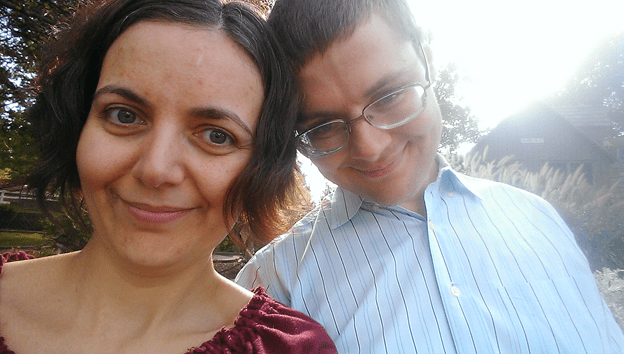Caption: Photograph of author and wife on Valentine’s Day outing (Image courtesy of Gleb Tsipursky)
___________________________________________________________________
On this upcoming Valentine’s Day, my wife and I decided to avoid traditional gifts such as fancy candy for her or a bottle of nice liquor for me in favor of making gifts that help preserve our democracy.
Both of us have been intensely worried by the claims Donald Trump made immediately after the election, and continuing to date, about how millions of illegal ballots supposedly cost him the popular vote. He is strongly considering launching an investigation into alleged voter fraud, despite the fact that his own lawyers earlier stated there was no mass voter fraud in the 2016 presidential election. Many prominent Republicans, such as Paul Ryan, pushed back against Trump on this issue, asking him either to present evidence or stop talking about this issue. As a result, prominent newspapers and fact-checkers have added Trump’s claims around voter fraud to his list of lies. Still, despite such pushback, according to polling, a majority of his followers believe Trump won the popular vote.
Trump is surrounding himself with allies who promote similar lies. For instance, we know that Trump’s pick for Attorney General has tried to suppress voting through prosecuting African-American activists for voter fraud, unsuccessfully, and more broadly promoting the false idea of widespread voter fraud among African-Americans and other minority groups.
We both think it not at all unlikely that if Trump lost in 2020, he would make claims of voter fraud favoring his opponent. Using the power of the presidency, he can launch massive investigations into such voter fraud. People such as his Attorney General could falsely claim and prosecute cases of supposed voter fraud, as there is a long precedent of previous Republican appointees pursuing such false claims. Given that in October 2016, when it looked like he might be losing the 2016 presidential election, Trump called the 2016 elections rigged, we see plenty of evidence that Trump does not respect American democratic institutions. Moreover, his supporters are very willing to believe him, and would likely come out on the streets if he calls for them to do so. We would face a true constitutional crisis, and it might spell the end of our political system as we know it.
As a result, we made a decision that instead of giving each other personal gifts on Valentine’s Day, we would make donations to nonprofits that might help avert this disaster. This is part of a Valentine’s Day tradition we started last year, when we gave gifts to nonprofits aiming to address global poverty, our top concern at that time.
We developed this new tradition as a way of trying to be more intentional about expressing our love for each other. My wife told me of an interesting study that found that people who give to charity feel happier than those who spend money on hedonistic pleasure. The experimenters gave people money and asked them to spend it either on themselves or on others. Those who spent it on others experienced greater happiness.
Not only that, such giving also made people healthier. Another study showed that participants who gave to others experienced a significant decrease in blood pressure, which did not happen to those who spent money on themselves. A third found that charitable giving correlates with decreased lung disease and arthritis.
So we decided to experiment by shifting our Valentine’s Day giving away from candies and liquor which, while fun, hardly improve our health. Instead, we began to give each other gifts that actually help us improve our mental and physical well-being, and the world as a whole, namely donating to charities in the name of the other person. For the same amount of money as we would spend on gifts for each other, we would get back something much more rewarding. This way, we could make each other happier and healthier and help other people at the same time, doubling the impact of spending the same money.
We decided to donate $50 per person, and keep the recipient of our gifts secret from each other, only presenting them at the restaurant when we went out for Valentine’s Day. Our only stipulation was to make a gift that maximizes lives saved, using guidelines from The Life You Can Save, an excellent charity evaluator that recommends over a dozen of the most effective charities for addressing global poverty to make sure we do the most good per dollar.
On Valentine’s Day, we went to our favorite date night place, a little Italian restaurant not far from our house. After a delicious cheesecake dessert, it was time for our gift exchange. She presented her gift first, a donation to the Against Malaria Foundation. With her $50 gift in my name, she bought 20 large bed-size nets that would protect families in the developing world against deadly malaria-carrying mosquitoes. In turn, I donated $50 to GiveDirectly, in her name. This charity transfers money directly to recipients in some of the poorest villages in Africa, who have the dignity of using the money as they wish. It is like giving money directly to the homeless, except dollars go a lot further in East Africa than in the United States.
We were so excited by our mutual gifts! They were so much better than any chocolate or liquor could be. We both helped each other save lives, and felt so great about doing so in the context of a gift for the other person. We decided to transform this experiment into a new tradition for our family.
This year, we decided to do the same thing, except donating that money to organizations that fight against lies in politics, thus helping preserve our democracy from authoritarianism. While we both serve on the Board of a nonprofit organization, Intentional Insights, which has a project dedicated to fighting post-truth politics, we decided in advance not to give to that organization as we already donate plenty to it, and such a gift would be too obvious and avoid the surprise element. I’ve really enjoyed researching other organizations addressing the myth of massive voter fraud or advocating against lies in politics, and have already made my gift. I’m eager to go on our outing for Valentine’s Day and present my wife with it, and find out where she gave her gift.
I invite you to have just such a conversation with your partners about making similar Valentine’s Day gifts! Such conversations would help show true love for your partner by improving her or his health and happiness, as well as addressing deep social problems. Is there any reason to not have that conversation?
____________________________________________________________________
Dr. Gleb Tsipursky runs the “Rational Politics” project at Intentional Insights, a nonprofit devoted to promoting rational thinking and wise decision-making in politics and other life areas. The “Rational Politics” project gathers reason-oriented citizens of all political stripes devoted to combating post-truth politics through using best practices in communicating and marketing both to get people to care about truth in politics and to provide them with the tools and resources to use evidence and reason in making wise political decisions. A best-selling author, he wrote Find Your Purpose Using Science and other books, and is the author of the forthcoming Solving Post-Truth Politics: Fighting Alternative Facts With Behavioral Science. He regularly publishes pieces on these topics in prominent venues such as Time, Psychology Today, The Conversation, Salon, Lifehack, Elite Daily, Sun-Sentinel, Arkansas Democrat-Gazette, Buffalo News, Lead Change Group, The Plain Dealer, Alternet, Inside Higher Ed, The Chronicle of Philanthropy, The Huffington Post and elsewhere. He also writes for reason-oriented venues such as Skeptical Inquirer, Secular World, Patheos, American Atheist Magazine, The Orbit, Skeptic Examiner, Secular Nation, Essays in the Philosophy of Humanism, The Human Prospect, and others as well. He published over 25 peer-reviewed articles in academic venues, as well as academic books, most prominently Socialist Fun: Youth, Consumption, and State-Sponsored Popular Culture in the Cold War Soviet Union, 1945-1970. He appears regularly on network TV, such as ABC 6 and Fox 28, radio stations such as NPR and Sunny 95, as well as internet-only media such as podcasts and videocasts. He researches decision-making and emotional and social intelligence in politics and business as a professor at Ohio State. He is also a speaker and consultant on these topics, and is available to speak to humanist groups through the AHA, SSA, and CFI Speakers’ Bureaus. Support his activism on Patreon or email him to discuss any aspects of the content he creates, to arrange a media interview, or hire him as a speaker, trainer, consultant, or coach: gleb (at) intentionalinsights (dot) org
















